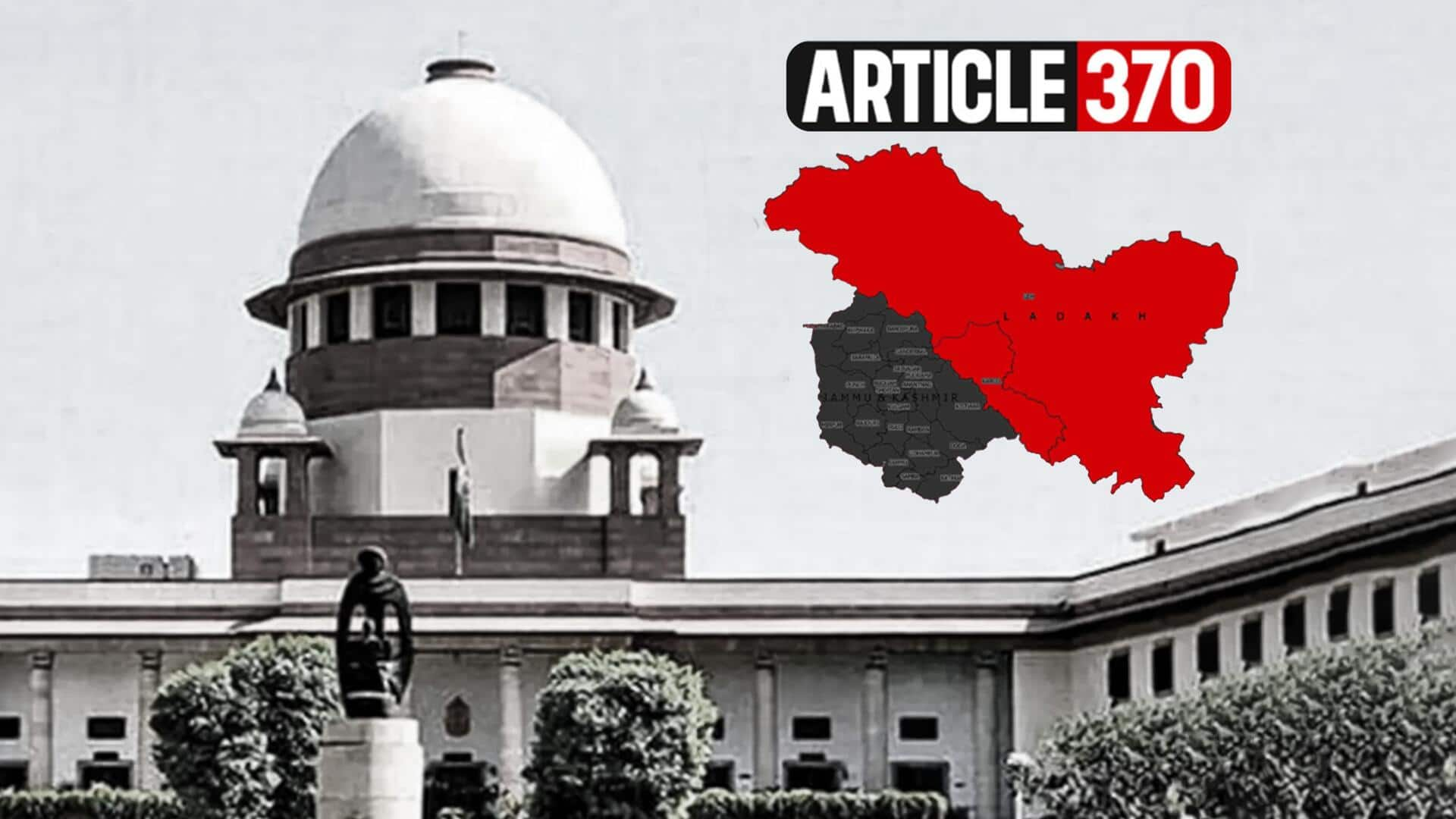
SC upholds Article 370 abrogation; J&K elections by September 2024
What's the story
The Supreme Court on Monday upheld Article 370's abrogation by the Centre in August 2019 as Chief Justice of India (CJI) DY Chandrachud noted it was a temporary provision.
It also asked the Centre to restore J&K's statehood soon and hold assembly elections by September 2024.
To recall, several petitions challenged the validity of the Centre's move that revoked Jammu and Kashmir's special status.
Context
Why does this story matter?
The Bharatiya Janata Party (BJP) at the Centre revoked Article 370 in August 2019 through the Parliament and divided the state into union territories of J&K and Ladakh while it was under the president's rule.
Petitioners claimed Article 370 couldn't be scrapped unilaterally by the Centre, as powers of the J&K Constituent Assembly were given to the state legislature after it dissolved in 1957.
Statement
Article 370 was temporary provision: CJI
On Monday, Chandrachud said Article 370 was a "temporary provision" due to war conditions in J&K.
"Textual reading also indicates that it's a temporary provision. The marginal note says it's temporary and transitory," he said.
CJI said the verdict included three opinions--one by him, Justice Suryakant, and Justice BR Gavai, while Justice SK Kaul and Justice Sanjeev Khanna have authored separate opinions.
CJI Chandrachud
'Presidential order that led to revocation valid'
The CJI also noted the president and Parliament were not restricted from taking over as governor/State Legislature under Article 356.
Chandrachud declared the presidential order that led to the revocation of Article 370 as "valid."
"We do not find the use of Presidential power to issue [Constitutional Order 273] was malafide. Thus, we hold the exercise of presidential power to be valid," he said.
Details
Reorganization of Ladakh as union territory upheld
CJI Chandrachud further said that there was "no need to examine whether J&K Reorganisation Act," noting that the solicitor general, on behalf of the Centre, declared that J&K's statehood would be returned soon.
On Ladakh's status, he added, "The reorganization of Ladakh as a union territory is upheld as Article 3 allows a portion of a state to be made as a union territory."
Sovereignty
'J&K did not retain any sovereignty after accession to India'
Chandrachud observed the state of Jammu and Kashmir didn't retain any element of sovereignty, terming Article 370 a "feature of asymmetric federalism."
He said J&K doesn't have any internal sovereignty that is different from other Indian states.
The CJI added the authority granted to the Parliament under Article 356(1) to exercise powers on behalf of the state assembly was not restricted to lawmaking alone.
Justice Kaul
Justice Kaul recommends panel to probe alleged human rights violations
Another judge on the SC's five-judge Constitution bench, Justice Kaul, recommended setting up a "Truth and Reconciliation Commission" to probe alleged human rights violations in J&K.
"Armies are meant to fight battles against enemies...not to control law and order," he noted.
"The entry of the army created its ground realities in the state...men, women, and children have paid a heavy price."
Details
SC reserved verdict on September 5
To recall, on September 5, the SC reserved its decision on Article 370 abrogation after a 16-day hearing from August 2. During the hearings, it considered submissions for and against the revocation.
The Monday verdict was pronounced by CJI Chandrachud-led Constitution bench, which comprises four other most senior judges of the SC: Kaul, Khanna, Gavai, and Suryakant.
Petitions
Main arguments by petitioners
The petitioners, including leading political parties of J&K, argued Article 370 was meant to be temporary until the J&K Constituent Assembly—which existed from 1951-57—decided on whether to abrogate it.
Since no decision was taken, Article 370 became permanent, they claimed.
There was no constitutional process to touch Article 370 later, and any changes could only have been made through a political process, they said.
Central government
Abrogation allowed development, better security: Centre
Meanwhile, the Centre argued the abrogation and reorganization of the erstwhile state were within the legal framework and that integrating J&K has reduced terrorism and encouraged development.
It also believed that Article 370 denied the J&K people many fundamental rights.
Except for defense, foreign affairs, finance, and communications, the special status mandated the Centre to get approval from the state government to enforce laws.
Proceedings
Parliament revoked Article 370 on governor's behalf: Centre
Moreover, the Centre earlier said that Jammu and Kashmir was under the president's rule in August 2019 and the governor of the erstwhile state thus assumed the powers of the Legislative Assembly.
It said the Parliament made the recommendation to revoke Article 370 on the Governor's behalf.
The government also told the SC that J&K's UT status is temporary and statehood will be restored.